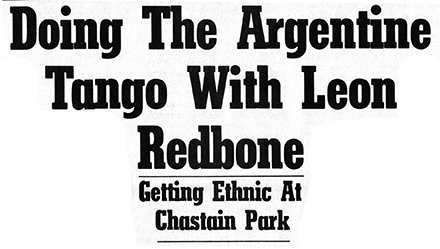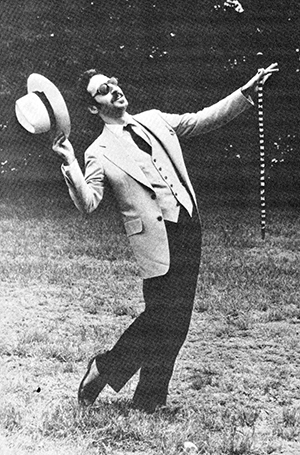
BY ALLEN RABINOWITZ
To call Leon Redbone an enigma is redundant. While others strive to create an air of mystery or work overtime creating riddles, myths and legends about themselves; Leon lets it all flow naturally.
Redbone is sitting backstage after a rain-threatened set at Chastain Park. He sits motionlessly on the cane chair, supervising the packing of equipment and sound effects. By his demeanor, it's hard to tell how he felt about the show. The audience, as wet and bedraggled as they were, loved Redbone's mix of old country and pop tunes, standards and ragtime. Underneath ponchos and umbrellas, signs of dancing and singing along were plentiful.
Redbone is dressed in clothes that accent his music. You'd half expect to find him outside some downtown bus station, guitar in hand, crooning for quarters. In a slow, measured voice, he gives his critique of the show.
“This did not make for a very interesting performance. I'm really not satisfied because I couldn't do anything subtle.” There had been problems with the monitor mix on stage due to the wet weather. “You can't hear what you're doing, you can't achieve any subtlety.” Subtlety seems to be the keynote of his career. Where most people performing this type of music might wrap their act in nostalgia and gimmickry, Redbone eschews any suggestion that what he's doing is a novelty act. “I have nothing to do with nostalgia,” he says in a voice with a slight tinge of a W. C. Fields-like accent, “I just happen to like these tunes. I prefer music that has a pleasant sound to it, or some kind of amusing sound. If not in terms of virtuosity, then in sentiment.”
He falls into a kind of trance, his face and body rigid. “I don't like doing ugly tunes. I like melodies, nice quiet melodies…” He stares off into space, as if listening to one of these pleasant tunes, and not to the questions being asked.
It's been rumored that Redbone was hostile to the press. Very little is known of his life outside music. There is speculation on every aspect· of his career. Today's interview would do nothing to clear up the mystery. Even to a simple question like “How old are you?” Redbone plays games with his interviewer. “How old is the average male? Seventy-two,” he answers his own question, “that makes me thirty six.”
Is anything about his past going to be answered, he's asked.
He gives out a laugh, “Probably not, but we can always try.” He next fields a question on how long he's been doing his act. “It hasn't been too long.” He thinks a second and amends his answer: “Sometimes it's too long, sometimes, it's not enough.”
 The interviewer makes one more stab at a question about his background, where was he born? “Where are we now? Right here in Atlanta.” Would he swear to that? Redbone, in a sphinxlike voice answers the question with another. “Would I lie to you?”
The interviewer makes one more stab at a question about his background, where was he born? “Where are we now? Right here in Atlanta.” Would he swear to that? Redbone, in a sphinxlike voice answers the question with another. “Would I lie to you?”
One thing that Redbone will talk about are his musical influences. He specializes in songs written in this country between the turn of the century and 1935. Included in his repertoire are such tunes as “The Sheik of Araby”, “My Blue Heaven” and “Alabama jubilee”. He finds that particular era of recording to be “far more interesting than anything that's been recorded since.”
Redbone claims that he has always listened to the music from this era, not only from this country, but from such places as Hungary and Argentina. In fact, he calls Argentine tango music from the 1920s one of his biggest influences. He says that he would like to do a-show of tangos, “just as I do legitimate tunes recorded in this country. I would like to do a legitimate show of Argentine tangos.”
Although the tango project may be a while off, Redbone is touring heavily, thanks to a good relationship with Atlantic Records, (which he joined after an unhappy tenure with Warner Bros.), and a hit single, a bouncy number called “Seduced”.
Though it sounds like the early 20th century pop music that Redbone specializes in, “Seduced” is a recently written song. It was originally introduced on Saturday Night Live by Richard Dreyfuss who planned to use the song in a scene from his detective film, The Big Fix. Redbone takes over the story: “The details are a bit sketchy, but Dreyfuss had a lot to do with it. I was in California at the time, Dreyfuss was finishing up the film. He noticed that I was playing in town. They wanted this tune (“Seduced”) to go in the movie. It didn't work the way they had it in mind, so they decided they needed a certain kind of voice to sing it. My voice was the right one for the tune, Dreyfuss called me and talked me into recording it.”
Redbone paused here, took a long drink from his glass before continuing the story. “The details are a bit sketchy because I was hypnotized,” he exclaims in his Fieldsian voice. “They hypnotized me and I can't remember the details.” As if to brush off the fact that the song was written after 1935, he says, “The fact that I was hypnotized means that I can't account for any of it.”
The conversation turns back to the charge of his performance being nothing more than a novelty act. His dander up, he explains, “It's a gross misunderstanding. I don't do a novelty act, I do some novelty tunes.” Back in the early part of the century, they referred to some of these songs as novelty tunes, which were actually offshoots of medicine show type of tunes. What is a novelty tune? It's something that people don't have a reference to. I guess by that definition I do novelty tunes.”
This type of categorizing angers him. “Unfortunately,” he says, “most people's concept of tunes these days is you either do this or that kind of music. Everybody likes a nice packaged deal. If you go by that definition, I don't fall into any category. I just play all kinds of tunes ... because they interest me.”
The interviewer tells Redbone that he still knows as little about him as he did before the show. Redbone states that he has been cooperating. He doesn't want to explain who he is and what he does, he wants the music and performance to stand by themselves.
“I'm not interested in explaining myself,” he says. “I'll answer any questions, but my object, my purpose, is not to explain myself. Hopefully, it's to do whatever I do, and try to do it in an entertaining way. I'll do the tunes, but I also have a sense of humor about the whole thing. I'll do the tunes the way I want to do them, and maybe mix a little hilarity into the whole thing. If you have a sense of humor and like the music, that's enough.”
He stared off again, perhaps engrossed in some early Argentine tango or an Ellington classic. It's hard to tell what decade he's in now. He bids the interviewer farewell, and rounds up his medicine show troupe for the next show in another town.